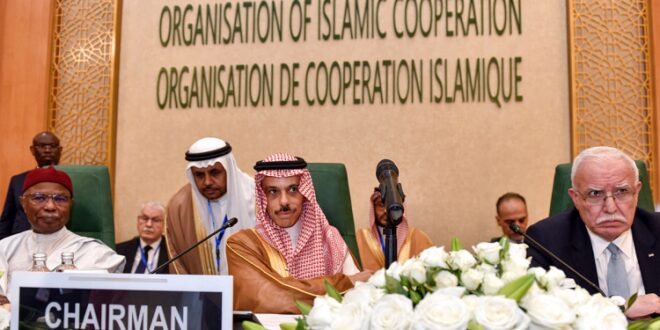A year after the restoration of diplomatic relations between Saudi Arabia and Iran, the two countries are working to ease regional tensions in the Middle East in exchange for promises of improved bilateral cooperation. But strains persist in the relationship between Riyadh and Tehran, and the two capitals are using the Saudi-based Organization of Islamic Cooperation (OIC), which includes members from 57 Muslim countries, to try to bridge their differences.
Riyadh and Tehran agreed to reopen their embassies last March, with a pledge to reactivate and deepen diplomatic ties. By April, they officially normalized their relations, a move that the OIC welcomed. This was followed by a series of high-level phone calls and regular visits, but also foot dragging on the conclusion of major agreements to boost economic and trade ties, regional security, energy cooperation, and tourism.
The improvement in ties led Saudi Arabia to offer economic incentives to Iran in return for assurances of its commitment to regional stability. The outbreak of war between Israel and Hamas on Oct. 7, 2023, sparked a flurry of diplomatic activity between the two regional powers to address the conflict at the OIC. By contrast, just three years earlier, in 2020, Riyadh had blocked an Iranian delegation from even taking part in the OIC meeting held in Jeddah.
When the United Nations General Assembly adopted a resolution in October 2023 calling for humanitarian truce between Israel and Hamas, Iran advocated for OIC talks on Gaza. President Ebrahim Raisi subsequently attended a Joint Arab Islamic Extraordinary Summit of the OIC held in Riyadh the following month. The first Iranian president to attend an OIC meeting in Saudi Arabia since 2012, Raisi tried to rally Muslim countries against Israel by calling for an end to the plight of Palestinians. His speech weighed on the Saudi leadership, which was entertaining normalizing relations with Israel before the outbreak of the war.
Brief bilateral talks between Crown Prince Mohammed bin Salman Al Saud and President Raisi, held on the sidelines of the OIC summit, highlighted their differences. Raisi expressed his interest in strengthening ties with Riyadh. The crown prince may have conditioned this on an unequivocal rejection of the war, implying that Iran’s backing for Hamas could be prolonging the conflict. Riyadh also urged the opening of a humanitarian corridor, an immediate halt to fighting, and the release of Israeli hostages and other detainees.
Back in Iran, hardliners slammed Muslim countries for not doing enough at the OIC. Newspapers described the final OIC Communique as a cliché that would lead to no action against Israel, and stressed that Hamas had called on the OIC summit to establish committees to facilitate humanitarian, relief, medical, and inter-parliamentary outreach to Gaza.
In March 2024, Iranian Foreign Minister Hossein Amir-Abdollahian urged OIC members once again to take measures to condemn Israel, in a meeting held by the body at Iran’s request in Jeddah. Meeting with his counterpart, Saudi Foreign Minister Faisal bin Farhan Al Saud, Amir-Abdollahian said Iran was satisfied with the level of bilateral cooperation, but he stressed the need for a coherent and strong position at the OIC in defense of Palestinians. The Saudi foreign minister urged cooperation on the issue through international forums, including the OIC and the United Nations.
Riyadh avoided inflaming Iranian anti-Israeli rhetoric by promising improved economic ties with Tehran, after Iran launched direct missile and drone attacks on Israel over the night of April 13-14, 2024, following an Israeli airstrike on Iran’s consulate in Syria earlier in the month. In late April, Saudi delegations participated in EXPO 2024, an international exhibition designed to showcase Iran’s export capacity. Tehran dispatched two delegations to Riyadh at the end of the month to participate in a special meeting of the World Economic Forum and a gathering of the Islamic Development Bank (IDB) on the 50th anniversary of its founding. The goal was to encourage Saudi and IDB investments in Iranian development projects and facilitate banking cooperation, with reports suggesting that Tehran may have received approval from the IDB for a proposal on preferential financing.
Despite these developments, if war spreads in the region, the future of the Iranian-Saudi normalization process will be clouded by uncertainty. When tensions were high, Saudi Arabia delayed issuing visas for Iranian pilgrims, forcing Tehran to cancel pilgrim flights for some 30,000 Iranians in February 2024, only to resume the pilgrimage in late April. Both sides now say the problem was technical, and Iran dispatched delegations representing the Supreme Leader Ayatollah Ali Khamenei and the Hajj and Pilgrimage Organization to resolve pending issues.
Tehran and Riyadh may draw closer in their views through the OIC, which is a public platform to facilitate discussions on Muslim affairs and regional conflicts. This helps the two capitals broaden their influence outside the UN, where the interests of world powers overshadow Iranian and Saudi diplomacy. The OIC is taking a public stance when the UN fails to adopt strong resolutions to bring about an end to the conflict in Gaza, holding ministerial-level committee meetings to address developments there, serving as a media observatory, and facilitating humanitarian assistance for the embattled coastal strip. But beyond these important diplomatic measures, it is unclear how much sway the OIC really has over the future trajectory of the Iranian-Saudi relationship.
 Eurasia Press & News
Eurasia Press & News




